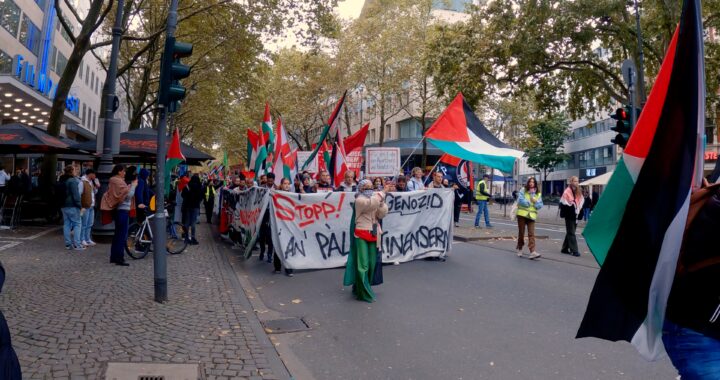AGAINST TIME
a filmic work by Stella AC susanne fasbender
In this work I intend to express a universal relationship through the montage of international and feminist struggles against war, extractivism, displacement and exploitation, against the destruction of nature and repression, and also undertake an attempt on the epistemic violence of hegemonic knowledge dominance.
In the course of the work and not least because of the shift to the right and the profound interview with the feminist Silvia Federici, 81 years old at the time of the interview at the end of 2022, whose richness springs from a long life of resistance, work and struggle and, as I think, should be preserved for future generations, I realized more clearly that I see a basis in the feminist-materialist analysis of capitalist conditions. Since the 1970s, the relationship between capitalism and feminism has been analyzed in terms of the reproductive sphere of our lives, the realm where life beyond wage labor actually takes place, or should take place, where it is renewed and sustained, but which, as an invisible economic sphere, is highly productive for capitalism. Why capitalism absolutely needs a devaluation of this sphere was brilliantly explained to me by Cinzia Arruzza in an interview in 2019. Based on the role of social reproduction for a country's total capital, this form of materialist feminism has identified the protagonists of the class struggle not only in the industrial proletariat, but also in the world of unpaid laborers, the dispossessed farmers, those enslaved in the free trade zones, and the indigenous peoples struggling for survival.
Many interviews, many conversations, many voices carry this filmic work. And each individual interview has its own special quality. In each conversation, a world is revealed that is lived by the person and their connections with others and with the world. They hold knowledge, a lot of knowledge from their research and from their experiences of resistance. Film is also a social thing. With the individuals in my film material, I can only treat them with appreciation and resonance if the anti-capitalist analysis makes sense and if the reproductive sphere is to have the value that belongs to it. This work is created in this sphere and it may well be just as infinitely long as the reproductive sphere is wide and extensive. I work embedded in my life, just as a painter sits at her pictures. For several years now, without public funding and in constant confrontation with the challenges of the times.
It is the voices and the presence of the persons who determine my journey of questions through the landscapes and streets of this country. This in turn is film, cinematic work, which consists of emphasizing, connecting, linking and adding, mixing sounds, images and space and time. And possibly eliminating time.
And with October 7, 23, Palestine was added, the total annihilation of a people as the culmination of a 100-year history of displacement and denial, for which the ruling powers today, without blinking an eye, and even in Germany, the place of the “original crime” (1 s. note.) that led to the genocide convention, are beginning to criminalize the international law of nations, following their agenda and now using tools from Trump model. Time may advance the events, the forms may change, more and more horrendous and cruel it becomes, but the underlying conditions are beyond the contemporary and are what we should tackle and understand.
1 Note: It was also the genocide of the Armenians in the Ottoman Empire in 1915, supported by the Germans, that the lawyer Raphael Lemkin empirically examined together with the Holocaust in the Second World War. He then created the term “genocide” and drafted the Genocide Convention, which was adopted by the United Nations in 1948.
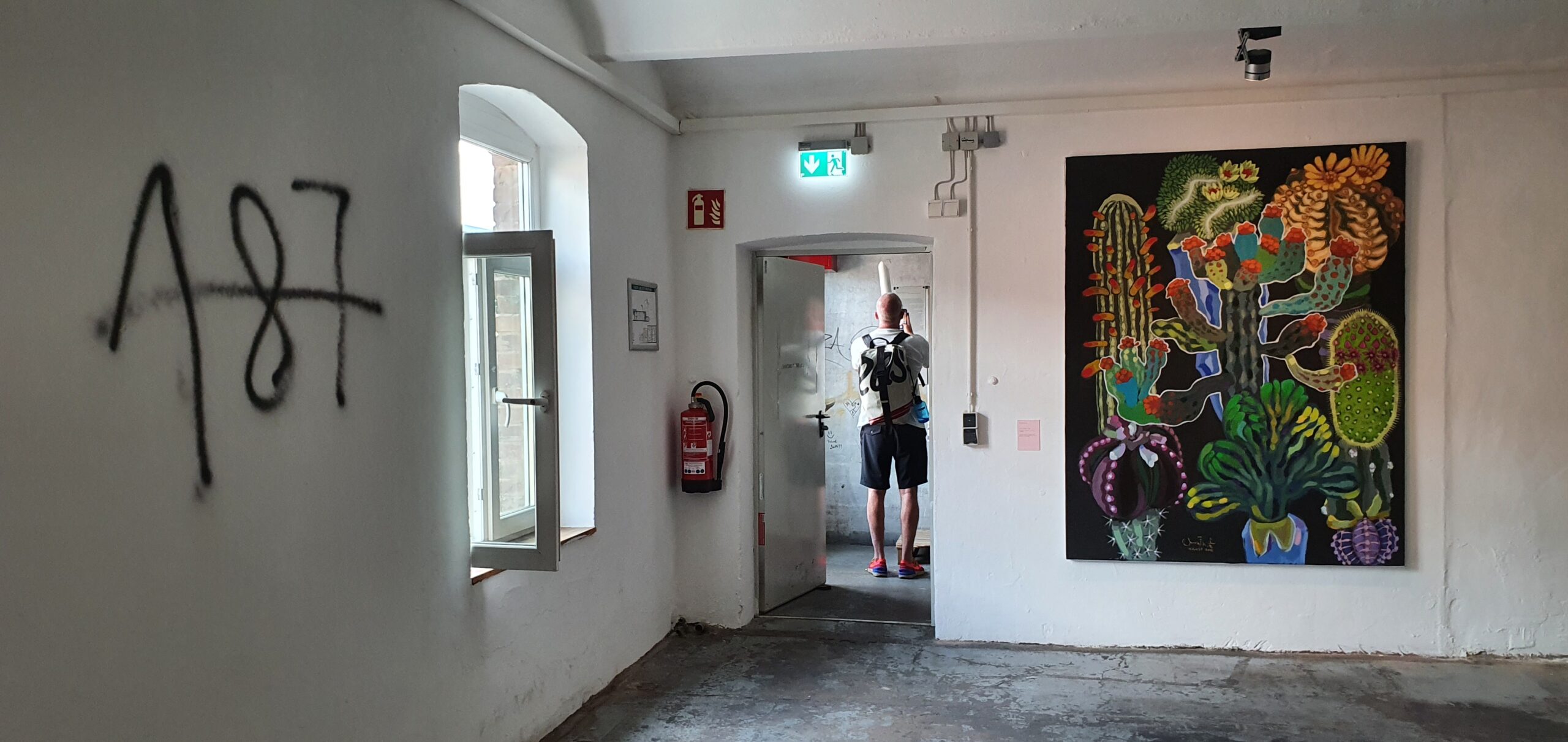
The death threat (187 - You will be the next) sprayed by unknown persons in the exhibition space of the invited Palestinian artists' group “The Question of Funding” before the opening of documenta15 in 2022 was played down by the German press as a “smear” and was neither scandalized nor removed during the entire exhibition. Instead, this attack was linked to a unanimous verdict that categorized the exhibition as “antisemitic” even before the opening. I saw German tourists walking through the exhibition, speaking disparagingly – “good Germans” who know that they are always on the “right” side.
I went to the international women's conference Women Weaving Futures, organized by the Kurdish women's movement, which took place in Berlin on November 22, It goes with the international Stop G7 caravan to the Karwendel Mountains, where Schloss Elmau is located, the place where the G7 summit took place in 2022, where vehement anti-war protests took place that did not appear in any of the press. It goes to Munich to protests against the IAA, it goes to Kassel to the documenta15. It goes to the Palestine movement in various places. But everywhere I meet people who network globally and tell of their struggles in the world.
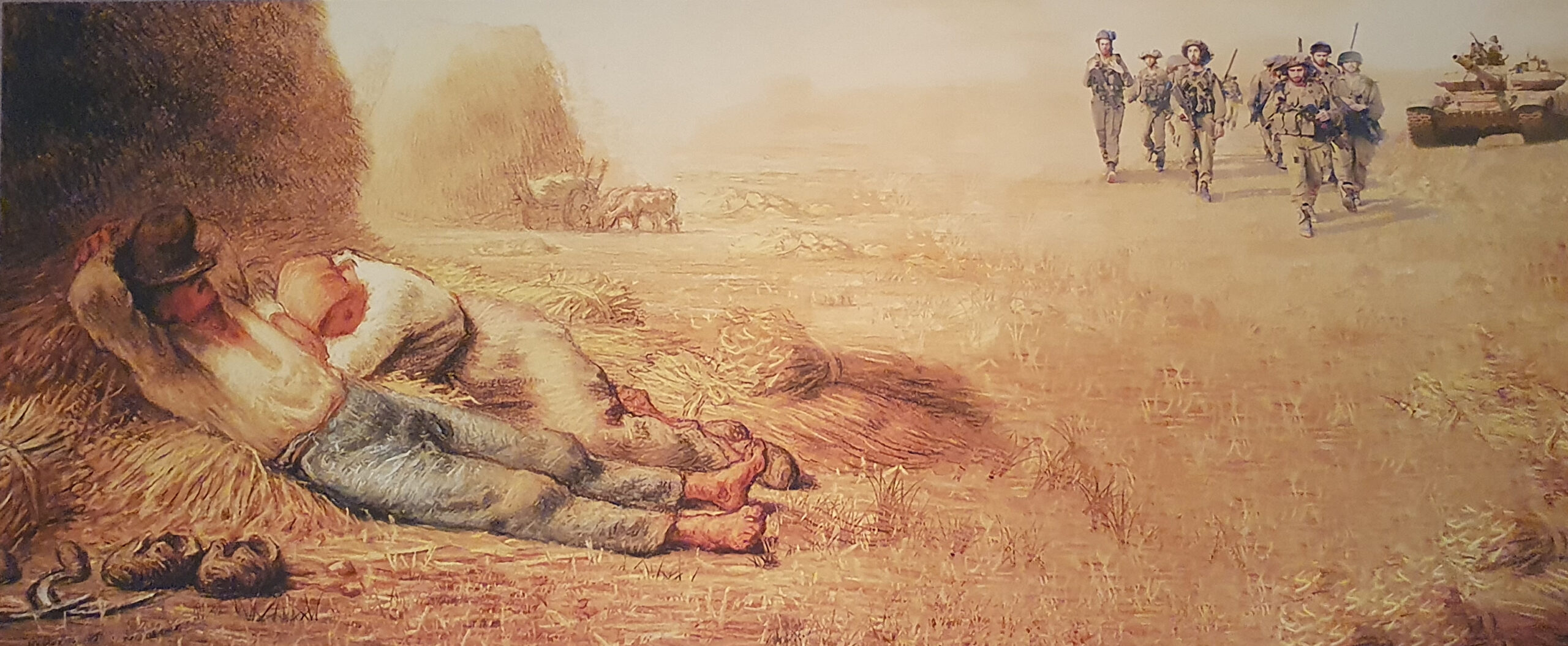
The series “Gaza Guernica” by the artist Mohammed Al Hawajri uses montages with excerpts from European realism, such as “A Rest from Work” by Jean-Christophe Millet, to address the sudden displacement of rural life that befell villagers in Palestine decades before the Nakba. By juxtaposing classic works of European art history with images of the Israeli military, he points to the deep roots of these expulsions in European history and its expansionism. The Sykes-Picot Agreement of 1916, in which the governments of Great Britain and France divided the Arab provinces of the former Ottoman Empire into four permanent zones of influence, is not insignificant in this context.
The German institutionalized accusation of Antisemitism, which has long been directed against Palestine solidarity and against Palestinians and has also been articulated with regard to postcolonialism since 2020, became a subject through the actuality of the Gaza war, making the unconditional criticism of the moral imperative of a German accusation campaign in the service of geopolitical interests fruitful for the anti-colonial, feminist and anti-capitalist statements of my film.
When German politicians instrumentalize the public commemoration of the November pogroms to threaten Palestinian protesters with political punishment, then a fundamental twisting in this “fight against antisemitism” has to be revealed. In 2020, when the Cameroonian philosopher Achille Mbembe was uninvited from the opening speech of the Ruhrtriennale (that has been followed to date by hundreds of further disinvitations of authors and scholars criticizing Israel), a world-renowned anti-colonial voice from Africa was silenced in Germany with the accusation of antisemitism, thus initiating the following discourse on antisemitism and anti-colonialism. This new inclusion of anti-colonialism in the accusation of antisemitism obviously points to the ban on criticizing the settler-colonial character of Israel's occupation of Palestine, but it goes further. Articulating and elaborating on this in more detail will be part of the film.
Because it is precisely in the analysis of the fight against antisemitism, as it is being talked about by the German government in agreement with the German far-right Alternative für Deutschland (AfD) (which means also a productive examination of the singularity thesis of the Holocaust) that, with the help of reading the many texts by historians, philosophers and genocide researchers who have dedicated themselves to the question of antisemitism / anti-colonialism since the Mbembe debate in the context of the so-called Historikerstreit 2.0, a liberated understanding of what antisemitism actually is unfolds. How the Holocaust can be understood in relation to other genocidal mass crimes of the 20th century and in relation to the transatlantic enslavement trade was elaborated.
It is important to me to emphasize the extent to which a controversial but scientific and vivid discourse took place here, on the basis of historical research, to remember mass violence beyond the Holocaust, to name and make comprehensible the respective historical contexts, while also rejecting any competition among victims almost unanimously. The authors have discussed questions ranging from denials to comparisons versus equations to public remembrance of genocides in a variety of scholarly ways and opened the way for me to break through a morally instrumentalized dictate in favor of an emancipatory move. The fact that German institutions have nevertheless turned the singularity thesis of the Holocaust into a dogma that simply ignores the richness of this discussion is a question of power, which brings us back to the above-mentioned epistemic violence.
The film thus continues to negate the hegemony of the answers that permeate the history of capitalism, including war, genocide and the destruction of nature, and questions the anchoring of the racialization of peoples within human society that has been developed over centuries, so that I can leave the text of the film's previous concept as it is:
How could the powerful distinctions: civilized / primitive, developed / underdeveloped, rational / irrational, livable / killable become politically effective and, at the same time, make the violent processes that led to their creation invisible? What do Eurocentric hegemonies of knowledge mean? Have they perhaps inscribed themselves into “Western” social consciousness in a way that could ultimately be seen as an impoverishment of thought? How can we break open the militarization, demarcation, walls, wars and destruction of nature that are postulated as a factual constraint, in order to sow a new seed in this rupture.
And yet, the end of violence is also present in us – in the midst of barbarism, genocide, the destruction of nature and the apocalypse. It is, to quote Karl Marx, “the dream” that already contains the reality, for which we lack consciousness – or the physical power to act – to bring this reality into the world in order to renew it. In this context, the often lamented dispute about how we should fight, think and orient ourselves is also understood as a productive driving force, as a constant of constantly new beginnings in a permanent, unfinished confrontation with the contradictions of the world. We meet in recognition of all our differences, but with the common goal of renewing the world from below.
My lecture "BRANDSPUREN – Epilog zur Unterscheidung – Von der eurozentrischen Aneignungslogik zur Entuferung des Weltenbrandes" (only in German) was created as part of my basic research
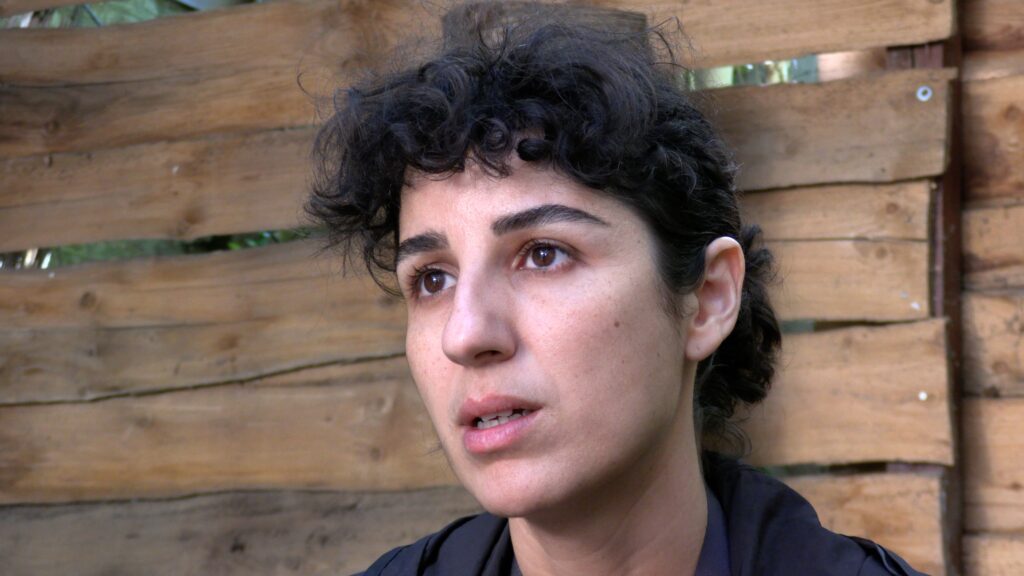
LE 18 is a multidisciplinary space for culture and residencies in the old city of Marrakech, founded by Laila Hida in 2013 and invited to documenta 15. Laila Hida discusses the questions they posed regarding the translation of their space into a representation at documenta in Kassel. They began their participation in d15 with a talk titled “Undoing documenta”. we wanted to open the conversation with the community in Kassel on what is Documenta, how we understand it, how do people understand it, what is expected from collectives and projects from the global south, that are invited here. And so, in the course of all this conversation that we had in the past months with our team, we understood that we were going the wrong way, when we're just answering, to an invitation from an understanding that was somehow a colonized understanding of what is documenta, what is an exhibition, or what is an art, manifestation. And at the time is that to say, that we are still unequal in this world and, that we don't work as artists in the same conditions. It's still problematic to show works from global south countries in this context because they're not understood properly. So you don't want to be a token in this context, of course.
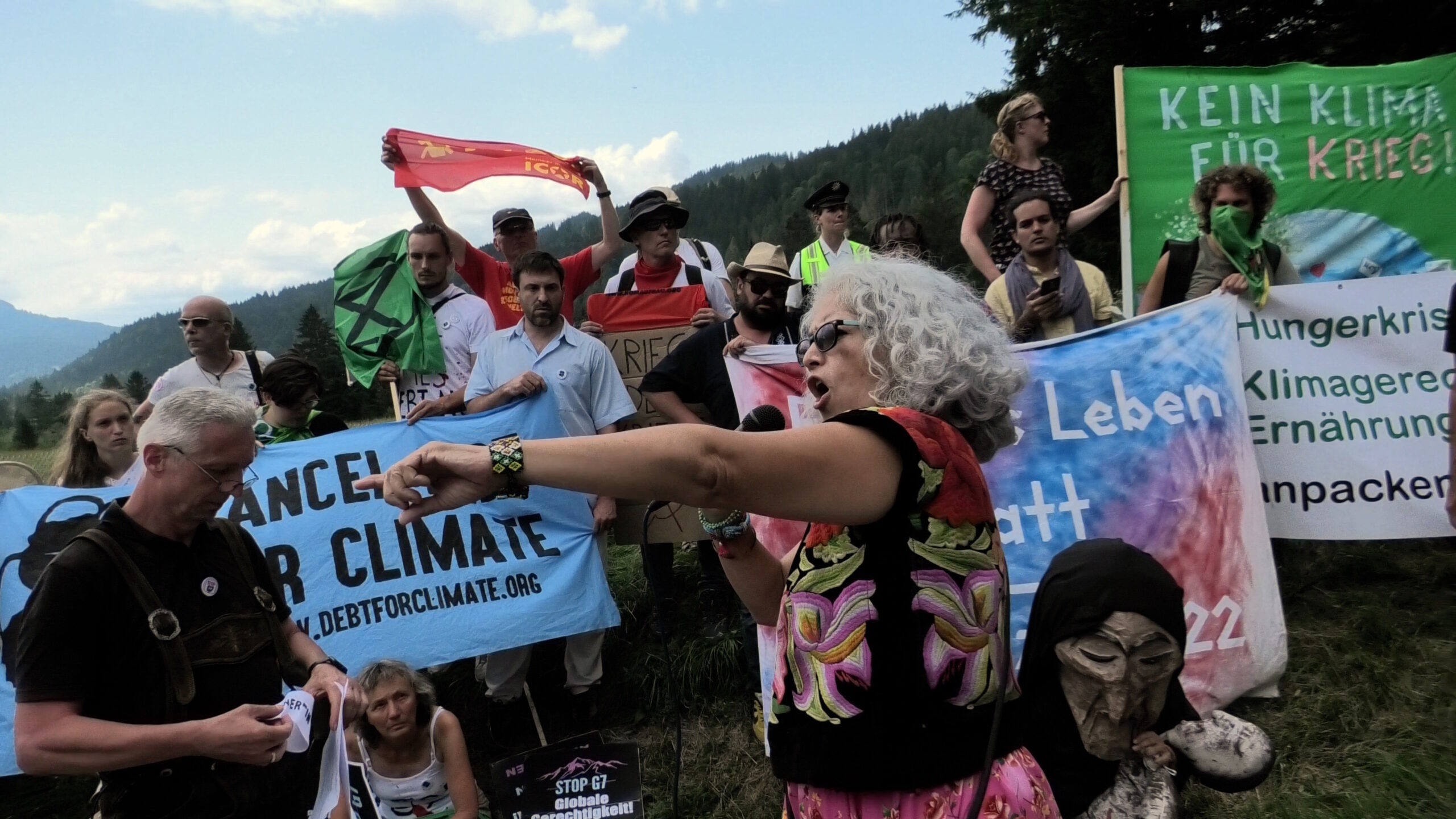
Bettina Cruz Velazquez (CNI, Asamblea de Pueblo des Istmo) with the "internationalist caravan for global justice and to mobilize against the G7 summit" at a rally at Schloss Elmau during the G7 summit: "I belong to an indigenous people from the south of Mexico, and we are here because we want to tell the G7 that they are not the masters of the world, but that they consider themselves the masters of the world because they have come here to decide our future!"

Silvia Federici: Communalism is a day-to-day condition without communal solidarity, without forms of communal infrastructure, we are not going to be able even to make a real fight. To have a real fight you really have to have that kind of solidarity that puts our lives in common - in a concrete daily way - in terms of of actually seeing that, when we think of our reproduction, of our life, we are thinking not in individual terms. This to me is extremely important. the commons as a condition for the struggle. It's the only way the struggles can actually grow and not just be episodic. One great moment, everybody in the street and then everybody goes home. But actually - build an infrastructure for struggle, struggles need an infrastructure. You have to reproduce the struggle. We (the women) are producing labour power, we are producing the capacity to work, therefore we need to reproduce the capacity to struggle. The commons is our struggle to reproduce the capacity to struggle.

Napuli Paul: I do not fight to have an enemy but I fight to be together to realize this world is ours. This world we should care for one another, you know. If we have respect, it's the big thing. Respect either individual or a group. Don't judge. Because some people can say oh you are, you know fighting individually. But we are in a group. We are the best. And then, you know, if you receive that energy, then it becomes, you know, you question yourself. If we respect ourselves, you respect the fight of the other people.
